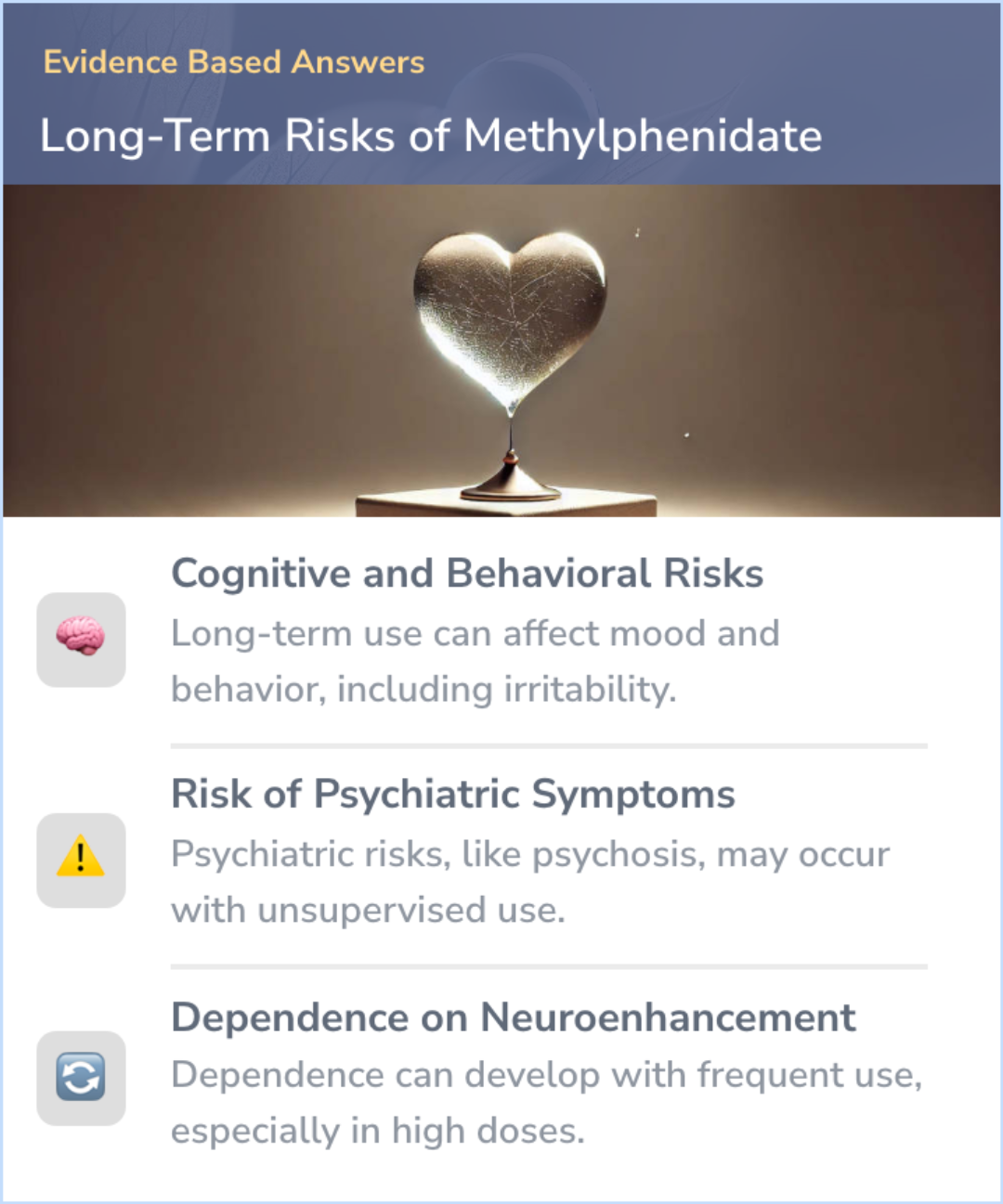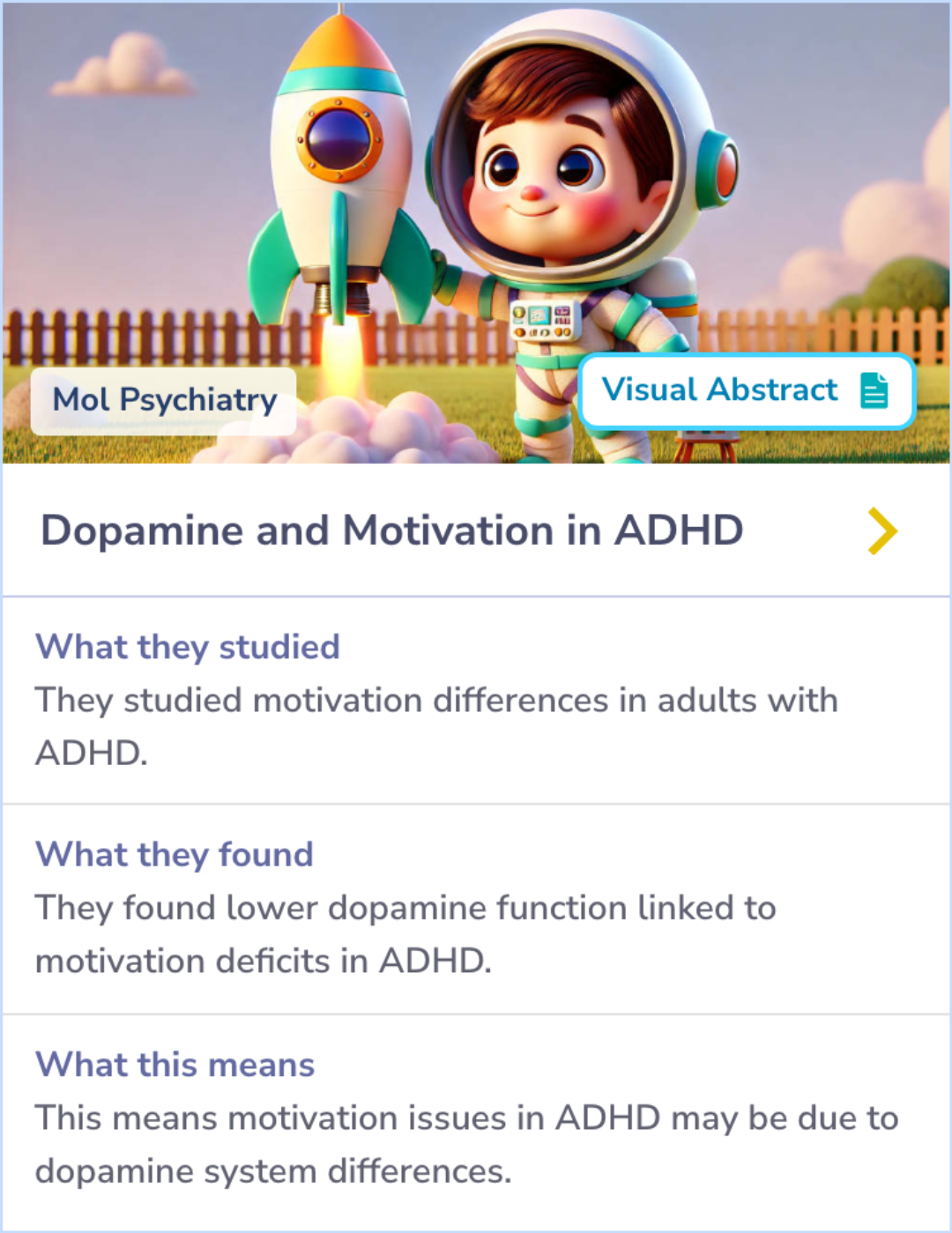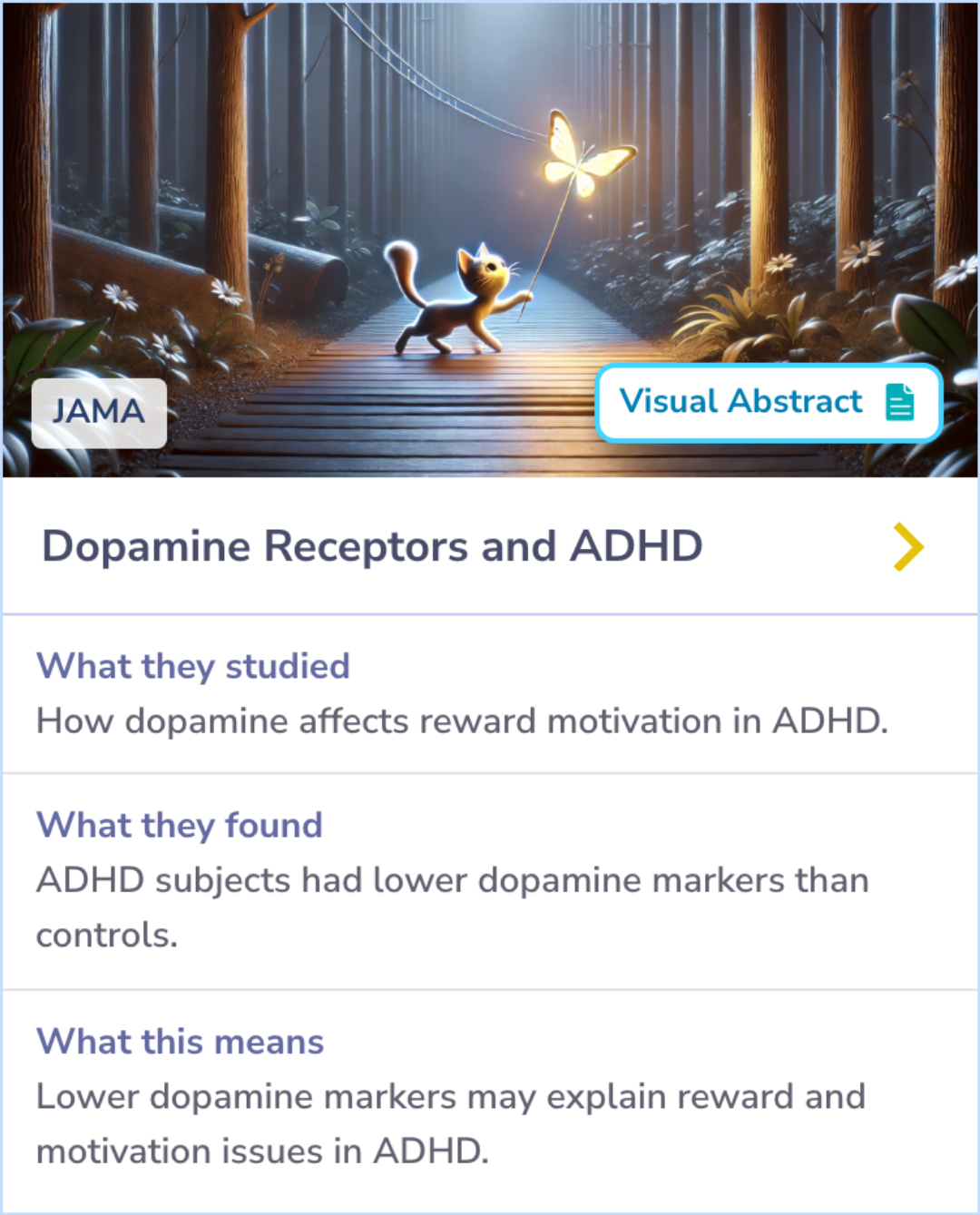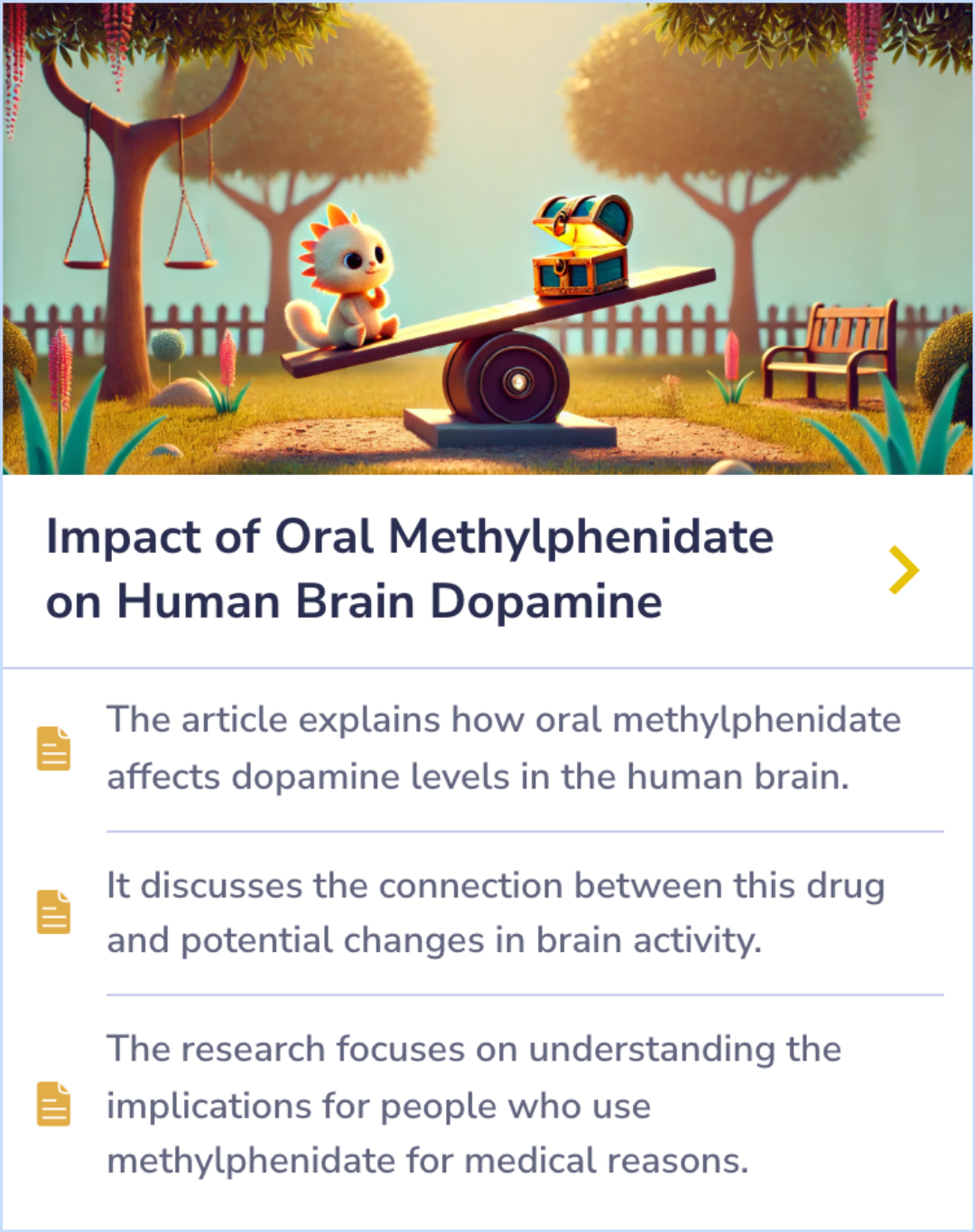Ritalin
Evidence Based Answers
What Are the Long-Term Risks of Using Methylphenidate for Neuroenhancement?
Long-term methylphenidate use for neuroenhancement can result in behavioral changes, psychiatric symptoms, and dependence, especially when taken without medical oversight.
Published: October 25, 2024
Click to explore a section:

Using methylphenidate for neuroenhancement can cause behavioral risks, psychiatric symptoms, and dependence.
The Rise of Neuroenhancement
Methylphenidate, originally developed for ADHD, has become popular among healthy individuals looking for cognitive enhancement. This trend is particularly common among students and professionals who want to improve focus and memory.
However, using methylphenidate outside of medical supervision raises serious concerns about long-term safety and ethical issues. Studies have shown that while methylphenidate can enhance cognitive performance, it also carries risks such as potential cognitive and behavioral disturbances, particularly with prolonged use.
However, using methylphenidate outside of medical supervision raises serious concerns about long-term safety and ethical issues. Studies have shown that while methylphenidate can enhance cognitive performance, it also carries risks such as potential cognitive and behavioral disturbances, particularly with prolonged use.
“
Source Quotes:
Apparently, psychostimulants are popular among healthy people seeking neuroenhancement. In an online poll conducted by Nature magazine, 20% of the 1400 responding readers reported use of MPH, modafinil or beta-blockers for non-medical reasons: 62% of users reported taking MPH and 44% modafinil.
Psychiatric Risks Linked to Neuroenhancement
Using methylphenidate for neuroenhancement, particularly in higher doses or without medical guidance, can increase the risk of psychiatric issues, including psychosis.
This risk is especially pronounced in individuals with pre-existing mental health conditions. However, even healthy individuals may face challenges with long-term use, as the drug's effects on the brain can lead to unexpected psychiatric symptoms.
This risk is especially pronounced in individuals with pre-existing mental health conditions. However, even healthy individuals may face challenges with long-term use, as the drug's effects on the brain can lead to unexpected psychiatric symptoms.
“
Source Quotes:
Psychosis has been reported in individuals who misuse or take excessive amounts of stimulant medication and may be an indication that a stimulant is being misused. Additionally, psychosis may be seen in individuals with a vulnerability to psychosis (e.g., comorbid schizophrenia, schizotypal personality disorder, mood disorders with psychosis, history of amphetamine-induced psychosis).
Treatment-emergent psychotic or manic symptoms, e.g., hallucinations, delusional thinking, or mania in patients without a prior history of psychotic illness or mania can be caused by stimulants at usual doses.
Risk of Dependence in Neuroenhancement
The use of methylphenidate for neuroenhancement can lead to dependence. The drug's impact on the brain's reward system increases the risk of psychological dependence over time.
As users may require higher doses to achieve the same effects, this can lead to a cycle of dependence, particularly in those using the drug without medical oversight. This is a significant concern as dependence can lead to severe consequences, both mentally and physically.
As users may require higher doses to achieve the same effects, this can lead to a cycle of dependence, particularly in those using the drug without medical oversight. This is a significant concern as dependence can lead to severe consequences, both mentally and physically.
“
Source Quotes:
Chronic abusive use can lead to marked tolerance and psychological dependence, with varying degrees of abnormal behavior. Frank psychotic episodes can occur, especially with parenteral abuse.
Prescription stimulants are subject to misuse, dependence, and/or diversion. Misuse of prescription drugs, including stimulants, is reviewed in detail separately.
Cardiovascular Risks of Neuroenhancement
Prolonged or high-dose use of methylphenidate can have serious cardiovascular effects, such as increased blood pressure and heart rate.
These risks are particularly concerning for individuals using the drug without medical supervision, as they may have undetected heart conditions that could be exacerbated by the drug. It's important to be aware that these cardiovascular effects may not diminish over time, leading to potential long-term health issues.
These risks are particularly concerning for individuals using the drug without medical supervision, as they may have undetected heart conditions that could be exacerbated by the drug. It's important to be aware that these cardiovascular effects may not diminish over time, leading to potential long-term health issues.
“
Source Quotes:
Consistent elevations in systolic and diastolic blood pressure (3 to 5 mmHg) and heart rate (five beats per minute) have been reported to result from stimulant treatment of ADHD in adults. The increases appear to be correlated, in part, to dose. Longer-term data on the cardiovascular effects of these medications in adults suggest that these effects do not diminish over time.
Key Takeaways
Conclusions
Long-term use of methylphenidate for neuroenhancement comes with significant risks that need careful consideration. The psychiatric risks include the potential for exacerbating existing mental health issues, especially in those with predisposed conditions. These risks necessitate ongoing screening and monitoring to prevent severe outcomes.
Moreover, the drug's impact on brain chemistry can lead to dependence, as it alters dopamine and norepinephrine levels, creating a cycle where users may require higher doses over time. Additionally, the cognitive benefits may diminish, and new behavioral challenges could arise. Cardiovascular health is another concern, with prolonged use increasing the risk of high blood pressure and heart rate issues, particularly in those with pre-existing conditions. Overall, while methylphenidate can offer cognitive enhancements, the long-term effects pose substantial risks that require vigilant management and informed decision-making.
Moreover, the drug's impact on brain chemistry can lead to dependence, as it alters dopamine and norepinephrine levels, creating a cycle where users may require higher doses over time. Additionally, the cognitive benefits may diminish, and new behavioral challenges could arise. Cardiovascular health is another concern, with prolonged use increasing the risk of high blood pressure and heart rate issues, particularly in those with pre-existing conditions. Overall, while methylphenidate can offer cognitive enhancements, the long-term effects pose substantial risks that require vigilant management and informed decision-making.

Evidence Summary
Motivation Deficits in ADHD Linked to Reduced Dopamine Activity
ADHD isn't just about inattention and hyperactivity; motivation also plays a big role. In adults with ADHD, brain scans reveal decreased function in the dopamine reward pathway. This lower dopamine activity correlates with reduced motivation levels, as shown by the Achievement scale scores in ADHD participants.
Interestingly, scores in motivation directly correlate with symptoms of inattention. Lower motivation seems intertwined with these symptoms, painting a fuller picture of ADHD's impact.
Interestingly, scores in motivation directly correlate with symptoms of inattention. Lower motivation seems intertwined with these symptoms, painting a fuller picture of ADHD's impact.
Evidence Summary
Exploring Dopamine Deficits in Adults with ADHD
ADHD, the most common childhood psychiatric disorder, often carries into adulthood and is linked to reward and motivation deficits. Researchers aimed to explore these deficits by examining key brain components using imaging techniques. They studied dopamine markers in 53 adults with ADHD, comparing them to 44 healthy individuals.
Results showed that individuals with ADHD had lower dopamine activity in important brain regions. These findings give insight into the biological underpinnings of ADHD and its associated symptoms.
Results showed that individuals with ADHD had lower dopamine activity in important brain regions. These findings give insight into the biological underpinnings of ADHD and its associated symptoms.
Evidence Summary
Effects of Methylphenidate on Brain Chemistry and Activity
Researchers have studied how taking methylphenidate affects brain chemistry, focusing on dopamine levels. This investigation sheds light on how the drug alters brain activity and influences users. Findings indicate significant changes to brain function under the influence of this medication.
The study specifically looks at the implications of these changes for individuals taking methylphenidate for medical purposes, highlighting the broad impact of its use.
The study specifically looks at the implications of these changes for individuals taking methylphenidate for medical purposes, highlighting the broad impact of its use.


